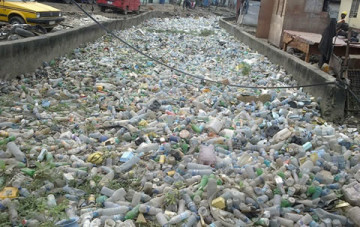‘Refuse, a major challenge to flood-free Lagos’
The major cause of flooding in Lagos is the indiscriminate dumping of refuse into waterways such as drains and canals, the Permanent Secretary, Drainage Services, Lagos State Ministry of the Environment, Mr. Ayodeji Adenekan, has said.
Adenekan, in an interview with journalists, said despite being a coastal area, refuse remained the greatest challenge to combating flooding in the state.
He said, “The greatest challenge is dumping of refuse in drains. If we don’t have refuse in the drains and it is only water, it will flow and only the silt will be left, because flood by its nature, carries sand.
“Flood is basically water and sand; so, as flood moves, the water moves too but the sand stays; but if it is only sand, it won’t be bad; but here in Lagos, it is compounded with pet bottles, pure water bags, plastics and all kinds of refuse. Our people still dump refuse in the drains.”
The permanent secretary, while speaking on the possibility of covering some drains in the state to discourage residents from dumping refuse in them, said there was a need for the people to develop positive attitude towards the environment by desisting from littering the drains.
Adenekan added, “Open and covered drains have their advantages; we combine them. There are some roads that are properly covered but it is difficult to clean such drains because the slabs are usually very heavy.
“We try to look at what is most appropriate; in the places where we need to cover drains, we cover; but in places where we do not need to cover, we leave them open.
“Until we have a good attitude to the environment, covered drains may not be appropriate. People still open manholes and dump refuse in them.
“When they are opened, it is easier to clean them but we cover where we see that there is danger, for instance, if we are going three to four metres down. When our attitude changes, we can cover everything.”
According to him, before the Nigerian Meteorological Agency’s report on the rains and flooding patterns for the year was released, the state had prepared by clearing its primary water channels to prevent heavy flooding, adding that black spots had been identified and workers had been sent to dredge such areas.
He added that over 25 primary channels and outfalls had been dredged, while over 13 would be dredged in the next phase.
Adenekan said the state was also collaborating with the Ogun Osun River Basin Development Authority on how to release water from the Oyan Dam so as to avoid flooding.
“We have agreed on how water would be released from the dam. It is necessary for the authority to release part of the water so that the dam will not be destroyed, but we have related with them well and agreed that they will release it gradually so that it doesn’t flood Lagos.
“The collaboration is still ongoing but there is cooperation,” he added.
Adenekan said there would be no major policy change in the new dispensation concerning the environment but that there would be consolidation on collaborations, especially with local government councils.
He noted, “We are now engaging the local governments more; bringing in vigour to what we are doing. We are carrying out sensitisation in the market places to prevent them from dumping their waste in the canals. We are trying to persuade people not to dump their refuse in the canal.
“Whatever you drop in the canal comes back to you; it is to nobody’s advantage. We are also going to enforce and in some places where it is possible, we will use barbed wire to protect the canals.”
He also stated that in Lekki and Ajah areas of the state, the problem was indiscriminate sand-filling, which creates flooding, but that the newly completed master plan had identified the problems and made recommendations that would soon be implemented.
On the Lagos Metropolitan Development and Governance Project funded by the World Bank to increase sustainable access to basic urban services through investments in critical infrastructure, Adenekan said the ministry had taken over some of the projects that were not completed, especially the drains.
“We have taken over the drainage projects that were not completed. What we are after is ensuring that the state is flood-free and the work is ongoing,” he explained.
PUNCH.


